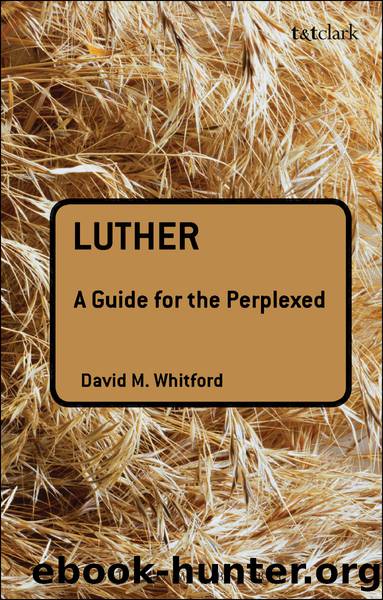Luther: a Guide for the Perplexed by Whitford David M.;

Author:Whitford, David M.;
Language: eng
Format: epub
Publisher: Bloomsbury Publishing Plc
Published: 2011-08-15T00:00:00+00:00
THE EFFECTS OF LUTHERâS VIEW
Lutherâs belief that Pope Leo X represented the Antichrist and was waging a war not to destroy him but to undermine the very fabric of the worldâs order had a number of almost immediate affects. First, it meant that if the pope followed through on the threat to excommunicate Luther that would be welcomed rather than dreaded. For Luther, it was a badge of honor to be condemned by the Antichrist. If he was so important to the Antichrist that he warranted the attention devoted to excommunication and the political maneuvering required to have him extradited to Rome for trial and execution, then it followed that the message that he was proclaiming was the Gospel and that the Gospel was a threat to the Antichrist. To be condemned by the Antichrist meant that he was truly representing Christ. When Luther finally received the papal bull threatening him with excommunication, he was given 90 days to recant. Instead of recanting, he went with a group of colleagues and students to the city wall and held a bonfire. Into the bonfire, the students and Luther threw the symbols of the Antichristâs reignâthey burned the bull threatening him with execution, but they also burned a copy of the medieval church law books that contained the Donation of Constantine. Second, if the pope was the Antichrist then neither he nor those loyal to him could be expected to help reform the church. Since Luther could not count on church officials to help reform the church, he had to turn to others for help. As early as November 1517, he had written to Archbishop Albrecht of Mainz hoping that he would end indulgence sales for the sake of the souls entrusted to his care. Albrecht instead resisted him and was the first to begin church legal proceedings against him. Leo X and Albrecht would not help, but Frederick the Wise and other committed Christian leaders within the community might. Luther has been faulted at times for linking his reforms to secular authorities. One must ask, however, where else should he have turned? For Luther, the battle with the Antichrist was a battle over the souls of men and women. To set aside the fight meant that he was abandoning those souls to hell. When Luther turned to secular authorities to help him reform the decaying church, it was not because he thought that they were either the best people or the most appropriate people to reform the church. They were not. Rightfully, it should have been fellow clergy, but those clerical leaders above him were now, in his mind, bound to the Antichrist. He turned to the secular lords because there was nowhere else to turn. Finally, the view that the pope was the Antichrist gave Luther hope. Ironically, the power of the Antichrist would be greatest and it would react with the greatest ferocity when it was actually most threatened. The ends to which the papal court went to destroy Luther convinced him that the Antichrist was in its final death throws.
Download
This site does not store any files on its server. We only index and link to content provided by other sites. Please contact the content providers to delete copyright contents if any and email us, we'll remove relevant links or contents immediately.
| Military | Political |
| Presidents & Heads of State | Religious |
| Rich & Famous | Royalty |
| Social Activists |
Waking Up in Heaven: A True Story of Brokenness, Heaven, and Life Again by McVea Crystal & Tresniowski Alex(37561)
Empire of the Sikhs by Patwant Singh(22837)
We're Going to Need More Wine by Gabrielle Union(18778)
Hans Sturm: A Soldier's Odyssey on the Eastern Front by Gordon Williamson(18381)
Leonardo da Vinci by Walter Isaacson(12958)
The Radium Girls by Kate Moore(11756)
Tools of Titans by Timothy Ferriss(8010)
Educated by Tara Westover(7795)
How to Be a Bawse: A Guide to Conquering Life by Lilly Singh(7267)
Permanent Record by Edward Snowden(5618)
The Last Black Unicorn by Tiffany Haddish(5485)
The Rise and Fall of Senator Joe McCarthy by James Cross Giblin(5158)
Promise Me, Dad by Joe Biden(4980)
The Wind in My Hair by Masih Alinejad(4931)
A Higher Loyalty: Truth, Lies, and Leadership by James Comey(4678)
The Crown by Robert Lacey(4639)
The Iron Duke by The Iron Duke(4184)
Joan of Arc by Mary Gordon(3895)
Stalin by Stephen Kotkin(3780)
